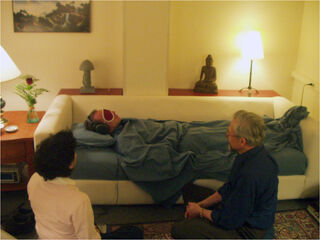Memory
Could Psychedelic Medicine Help People Living With Memory Loss?
Magic mushrooms for memory loss? An expert explains the potential.
Posted August 10, 2022 Reviewed by Gary Drevitch
Key points
- Psychedelics have shown promise as treatments for major depression and substance use disorders.
- Recent studies suggest psychedelics could help spur growth of new connections in key brain regions.
- Research is examining the potential of psilocybin, a natural psychedelic in some mushrooms, for depression in people with mild memory loss.

Although shrouded in taboo since their international banning in the 1970s, psychedelics have slowly re-entered clinical research over the past several decades. So too has interest permeated the broader culture, as evidenced by Michael Pollan’s best-selling book How to Change Your Mind, and its new companion Netflix special.
Earlier on this page, we considered the hypothetical of whether these ancient healing compounds could benefit people living with dementia. While this remains an open question, research has started exploring this new frontier. Given the consistent failures of anti-Alzheimer’s drugs, which have a virtual 100% fail rate, not to mention growing controversies in the field around data falsification supporting the dominant theory driving drug development, there is a need for out-of-the-box thinking.
Albert Garcia-Romeu of the Johns Hopkins University School of Medicine studies the effects of psychedelics in humans with a focus on psilocybin (a natural psychedelic found in some species of mushrooms) in the treatment of addiction. He is currently leading a study using psilocybin-based therapy with people living with mild memory loss, and their carers.
We spoke to Dr. Garcia-Romeu about the psychedelic medicine movement and his dementia-related study.
What drew you to this somewhat stigmatized area of research?
My initial interests involved intersections of Western psychology and Eastern spiritual traditions. This led to wider exploration of altered states and transformative experiences that people sometimes report to have profound mental health benefits like promoting recovery from addiction. This eventually led me to studying psychedelics, which have a long history of use in indigenous and recreational settings precisely for their ability to elicit these types of experiences.
As I learned more about the pharmacology underlying psychedelics’ effects and joined the team at Hopkins, our research gradually shifted to studying their therapeutic potential, which has opened up some exciting possibilities including our current study in people with Mild Cognitive Impairment (MCI).
What have you learned thus far?
I’ve primarily been working with Dr. Matt Johnson and colleagues studying psilocybin as an aid in addiction treatment. We’ve conducted studies looking at feasibility of psilocybin paired with cognitive behavioral therapy (CBT) for people who want to quit smoking cigarettes. Our most effective treatments typically have long-term success in around one-third of people who use them, which leaves lots of room for improvement. Our early pilot study published in 2014 found that for 15 smokers who got 2-3 high doses of psilocybin with CBT, 80% quit smoking and remained abstinent 6 months later.
That study was admittedly limited by small sample size and lack of control group, so we’re now conducting a larger trial with neuroimaging, and have new trials in planning now. Since then, our group and others have also published positive findings showing lasting benefits after just 1-to-2 high doses of psilocybin for reducing anxiety and depression in people with life-threatening illness such as cancer, and for treating major depression. That work and other studies have continued opening new questions about therapeutic potentials and mechanisms of psychedelics that we are exploring now.
What sparked your thinking about how these compounds might potentially help those facing memory-related challenges?
Recent studies have highlighted neuroplasticity as a potential therapeutic mechanism of psychedelics. Specifically, studies in animals and cellular models have shown a single dose of classic psychedelics like psilocybin or LSD can increase dendritic spines and synapses in key parts of the brain like the frontal cortex. These are the basic structural and functional connections our brain cells use to communicate and that are known to degrade in neurodegenerative conditions, so the idea that psychedelics might attenuate that degradation is compelling.
Beyond that, a number of studies have shown enhancement in learning and memory processes in animals after administration of drugs like psychedelics that target serotonin 2A receptors, implying a potential cognitive-enhancing mechanism. Finally, we know that many people living with dementias bear the additional burden of depressed mood, anxiety, and reduced QOL [quality of life] that can accompany their condition. The current body of human research suggests psilocybin and other psychedelics can lead to lasting reductions in anxiety and improvements in mood/QOL, so we consider those important avenues to investigate.
Has anything surprised you so far in the MCI-psilocybin study?
We are in early stages, so we can’t say anything conclusive yet. However, I’d say participants have had largely positive experiences that—despite some memory loss—often touched on earlier experiences in their lives. This is a fascinating observation in line with our earlier studies, specifically that formative experiences and important relationships throughout the lifespan can come up during psilocybin sessions and sometimes elicit useful insights and even emotional healing around areas of psychological wounding. It’s been fascinating to sit with people through these experiences and hear their reflections, and I’m eager to learn more.
Why did you decide to include close friends/family members of participants?
It’s often the case that we can glean useful information about moods, symptoms, and habits of patients by asking someone close to them like a spouse, family member, or close friend. However, we also know that those in close relationships with patients can struggle with their own well-being, including concerns and anxieties about their loved ones. Our hope is that effective treatments that improve QOL, for instance in people with MCI, might also ease these worries and lead to some benefit for friends and family members. That’s our overarching question, and by including loved ones, it provides us with another layer of information to track a patient’s well-being.
How do you see this dementia-focused research evolving?
A lot of the interesting questions will revolve around whether psychedelics can be useful in neurodegenerative conditions, and, if so, which psychedelics for what conditions. This alone could spawn studies like the one we are conducting on other substances like ayahuasca, LSD, mescaline, or DMT, across a variety of conditions.
If some pan out, optimizing treatment parameters will be critical to figure out what doses, treatment regimens, and supportive therapies or medications will create the most therapeutic benefit. Additionally, finding ways to individually tailor treatments based on phenotypic/genotypic markers will be helpful. If we can answer some of those questions, we will be making great headway. Of course, there are also a lot of questions surrounding the biological and brain-based mechanisms that could yield loads more research, so our work is cut out for us. For now, I am cautiously optimistic about the future of research on psychedelics for neurodegenerative diseases.
How can people learn more about your MCI study?
People can visit our website and fill out the application form. We are still warmly welcoming new participants.




